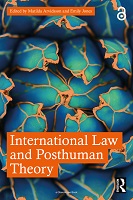Chapter 11 Supplanting Anthropocentric Legalities
Proposal review
Can the Rule of Law Tolerate Intensive Animal Agriculture?
Abstract
This chapter explores how the rule of law can support
emergent legislative proposals in a handful of jurisdictions
around the world to curtail intensive animal farming. Part
1 reviews the global emergence of these legislative
proposals to date and identifies their common features or
themes, as well as their limited success. Part 2 then
discusses the pliability of the rule of law to serve as an
agent of social change in general as well as in the realm of
intensive farming. It explains how the rule of law can be a
persuasive discursive legal tool in generating actual legal
regulation to address social problems such as intensive
farming and connects the analysis to broader questions
regarding norm development in international law. Drawing
on posthuman feminist theory, the chapter contributes to
the growing field of global animal law that explores animal
law issues through international law and transnational law
frameworks, by highlighting the potential of the rule of law
to challenge the legitimacy of at least some forms or
portion of animal-based food systems. The chapter seeks to
add to the developing conversation as to how to supplant
existing anthropocentric legal norms through innovative
deployment of new legal arguments in favor of animals.


 Download
Download